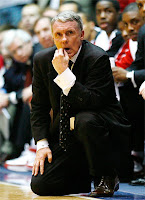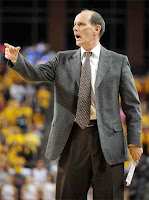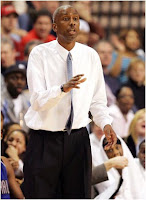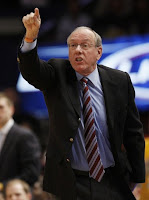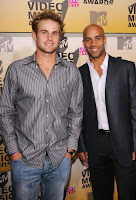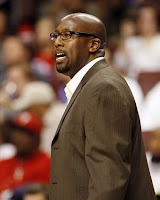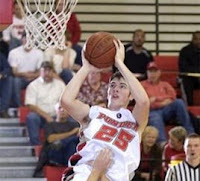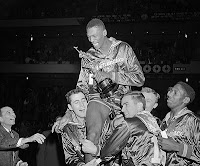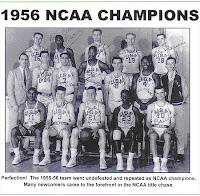
A big key to winning in the NCAA Tournament is having pro prospects, whether NBA, D-League, or European League.
Here's a list of guys I'd consider "difference makers" at the college college level who are playing in the NCAA tourney. [Ranked by pro potential.]
SOUTH REGION1. Blake Griffin - Oklahoma, PF
2. James Harden - Arizona State, OG/SF
3. Ty Lawson - UNC, PG
4. Willie Warren - Oklahoma, OG
5. Tyler Hansbrough - UNC, PF
6. Jonny Flynn - Syracuse, PG
7. Austin Daye - Gonzaga, SF
8. Gordon Hayward – Butler, SF
9. Ed Davis - UNC, PF
10. Manny Harris - Michigan, OG
11. Trevor Booker - Clemson, F
12. Marcus Thornton - LSU
13. Jeff Pendergraph - Arizona State, PF
14. Wayne Ellington - UNC, OG
15. Jeremy Pargo - Gonzaga, PG
16. KC Rivers - Clemson, OG
17. Matt Bouldin - Gonzaga, OG
18. Danny Greene - UNC, SG/SF
19. Josh Heytvelt - Gonzaga, PF
20. DeShawn Sims - Michigan, PF
21. Dionte Christmas – Temple, G
22.A.J. Slaughter -Western Kentucky ,OG
Others of note in South Region: Tasmin Mitchell (LSU), Matt Howard (Butler), Mike Tisdale (Illinois), Artsiom Parakhouski (Radford), Matt Kingsley (SFA),Orlando -Mendez-Valdez(Western Kentucky), Chester Frazier (Illinois/injured).
EAST REGION1. Gerald Henderson - Duke, OG
2. Jrue Holiday - UCLA, OG
3. DeJuan Blair - Pittsburgh, PF
4. Kyle Singler - Duke. SF
5. Darren Collison - UCLA, PG
6. Damion James - Texas, PF
7. Eric Maynor - VCU, PG
8. Sam Young - Pittsburgh, SF
9. AJ Abrams - Texas, PG
10. Tyler Smith - Tennessee, SF
11. LeVance Fields – Pittsburgh, PG
12. Scotty Hopson - Tennessee, OG
13. Derrick Brown - Xavier, PF
14. Toney Douglas - Florida State, OG
15. Jon Scheyer – Duke, G
16. James Anderson -Oklahoma State, SF
17. Larry Sanders -VCU, PF
18. Corey Fisher – Villanova, PG
Other East Region players of note: Scottie Reynolds (Villanova), Dante Cunningham (Villanova), Dexter Pittman (Texas), Lawrence Westbrook (Minnesota),Solomon Alabi( Florida State ), Ralph Sampson (Minnesota), Elliott Williams (Duke), Marcus Landry (Wisconsin), Derrick Mercer (American), Courtney Pigram (ETSU), Jeremiah Dominguez (Portland State), DJ Rivera (Binghampton).
MIDWEST REGION1. Jeff Teague - Wake Forest, G
2. Jordan Hill - Arizona, PF
3. Earl Clark - Louisville, SF
4. BJ Mullins - Ohio State, C
5. Al-Farouq Aminu - Wake Forest, F
6. DerMar Derozan - USC, SF
7. Evan Turner - Ohio State, F
8. Terrance Williams - Louisville, SF
9. Cole Aldrich - Kansas, C
10. James Johnson - Wake Forest, F
11. Chase Budinger - Arizona, SF/OG
12. Samardo Samuels - Louisville, F
13. Devin Ebanks - West Virginia, F
14.Kalin Lucas (Michigan State), PG
15. Sherron Collins - Kansas, PG
16. Raymar Morgan - Michigan State, F
17. Taj Gibson - USC, PF
18. Tyrese Rice - Boston College, G
19. William Buford - Ohio State, OG
20. Tony Woods - Wake Forest, C/PF
21. Luke Nevill - Utah, C
22. Tyshawn Taylor – Kansas, PG
23. Daniel Hackett – USC, PG
24. Nic Wise – Arizona, PG
25. Ben Woodside – North Dakota State, G
26. Chris Wright – Dayton, F
27. Kenneth Faried - Morehead State, PF
Other Midwest Region players of note: DaSean Butler (West Virginia), Brandon Brooks (Alabama State), Goran Suton (Michigan State), Jeremy Chappell (Robert Morris), J'Nathan Bullock (Cleveland State), Chief Kickingstallionsims (Alabama State),Ty Walker ( Wake Forrest )
WEST REGION1. Hasheem Thabeet - UConn, C
2. Tyreke Evans - Memphis, PG
3. Jarvis Varnado - Mississippi State, C
4. Jerel McNeal - Marquette, OG
5. Kemba Walker – Connecticut, PG
6. Greivis Vasquez - Maryland, G
7. AJ Price – Connecticut, PG
8. DeMarre Carroll - Missouri, SF
9. Robbie Hummel - Purdue, OG
10. Jon Brockman - Washington, PF
11. Lee Cummard - BYU, OG/SF
12. Wesley Matthews - Marquette, SF
13. Jerome Randall - California, PG
14. Ryan Whitman - Cornell, OG/SF
15. Patrick Christopher - California, OG
16. Isiah Thomas - Washington, PG
17. Jeff Adrien – Connecticut, PF
18. Gary Williams -Utah State, PF
Other West Region players of note: JaJuan Johnson (Purdue), Josh Carter (Texas A&M), Dominic James (Marquette/injured), Theo Robertson (Cal), Justin Dentmon (Washington).
Top NIT players ( ranked as pro prospects):1. Greg Monroe - Georgetown, PF/C
2. Stephen Curry - Davidson, PG
3. Patrick Mills - St. Mary's, PG
4. Patrick Patterson - Kentucky, PF
5. Jodie Meeks – Kentucky, G
6. Korvotney Barber – Auburn, F
7. Jerome Jordan - Tulsa, C
8. DaJuan Summers - Georgetown, SF
9. Talor Battle – Penn State, PG
10. Nick Calathes - Florida, OG
11. Luke Harangody - Notre Dame, PF
12. Jack McClinton - Miami, PG/OG
13. Curtis Jerrells - Baylor, PG
14. Tory Jackson – Notre Dame, PG
15. Tony Danridge – New Mexico, OG/SF
16. LaceDarius Dunn – Baylor, OG
17. Chad Toppert – New Mexico, OG
18. Darryl Monroe – George Mason, PF
19. Glenn Andrews – Tulsa, F
20. Lawrence Kinnard – UAB, SF
21. DeQuan Jones - Miami, OG
22.Omar Samhan- St. Mary's, C
23. Damian Saunders - Duquesne, PF
24. John Vaughan – George Mason, G
25. Diamon Simpson-St. Mary's, PF/SF
26. Devan Downey – South Carolina, PG
27.Taylor Rochestie- Washington State, G
others of Note
Aaron Jackson (Duquesne)
Jacob Pullen ( Kansas State )
A.D.Vassallo ( Virginia Tech)




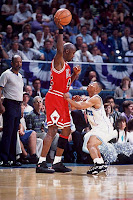





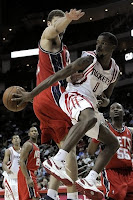





 Found a great little book by Jeffrey Gitomer the other day titled "
Found a great little book by Jeffrey Gitomer the other day titled "


